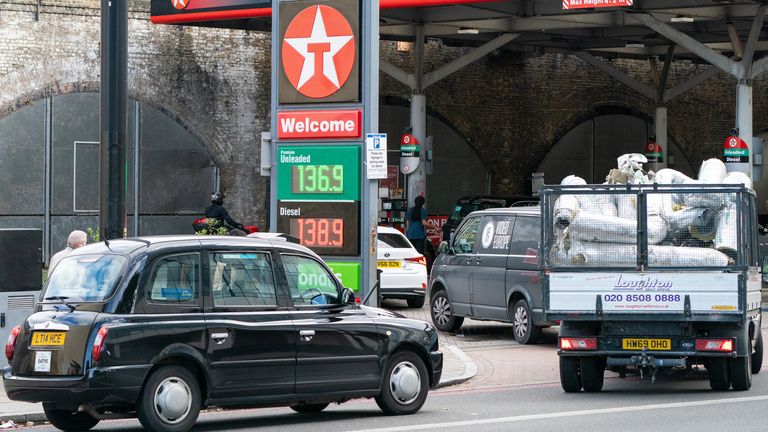The fuel supply crisis is “virtually at an end” in parts of the UK, but problems persist in London and the South East, the Petrol Retailers Association has said.
There has been no overall improvement in the crisis in the last 24 hours, the group added.
However, issues with getting fuel were “virtually at an end” in Scotland, the North and the Midlands, where only 6% of filling stations are empty.
PM not ruling out more temporary visasIn London and the South East, 22% of filling stations were dry, and 60% had both grades of fuel available.
Overall, 17% of petrol stations remain empty in the UK, while 67% have both grades of fuel available, the group said.
AdvertisementLive updates from the Conservative Party conference
From 4 October, army tanker drivers are to start delivering fuel to petrol stations in an emergency move prompted by the continuing crisis at the pumps.
More on Fuel Crisis Related Topics: fuel crisissupply crisisAlmost 200 soldiers – including 100 drivers – have been training with haulage firms this week, learning how to fill up tankers and petrol pumps, and the first army deliveries will be made early on Monday morning.
Image: Military drivers will be deployed to deliver fuel to forecourts from Monday as the crisis at the pumps continueAnnouncing the move, Defence Secretary Ben Wallace said: “While the situation is stabilising, our armed forces are there to fill in any critical vacancies and help keep the country on the move by supporting the industry to deliver fuel to forecourts.”
Brian Madderson, PRA chairman, said: “The fuel is still not going to the pumps that need it most in London and the South East.
“There is a plentiful supply at filling stations in the North (and little queuing) but we now need the government to work with the downstream fuel industry on ‘levelling up’ London and the South East, where the fuel is most needed right now.”
Image: Oliver Dowden said the government is working tirelessly to address the fuel crisisMr Madderson added that the PRA is “disappointed that no concerted action is being taken” to address the supply problems in London and the South East.
“It is hard to see what benefits there have been from the suspension of competition law. Our members report that they are missing out on supplies, having not been able to see where deliveries are going,” he added.
Prime Minister Boris Johnson has not ruled out a further relaxation of immigration rules to help ease the supply shortages – but he also insisted that he does not want to see a return to “a lot of low-wage immigration”.
Amid the continuing queues at petrol stations across the country, the government has said 300 fuel tanker drivers will be able to come to the UK from overseas “immediately” under a bespoke temporary visa which will last until March.
Fuel supply crisis: Why is Europe short of lorry drivers and how bad is the crisis?
Some 4,700 other visas intended for foreign food haulage drivers will be extended beyond the initially announced three months and will last from late October to the end of February.
There have also been calls for the visa programme to be extended to HGV drivers in all sectors of the retail industry.
Asked on Saturday whether he would rule out further relaxations to immigration rules, Mr Johnson said the possibility of more visas would be kept “under review”.
“What we have now is a system that allows us to control immigration,” he said.
“That gives us flexibility – we can open up our markets if we need to. And, of course, we’ll keep everything under review.”
Follow the Daily podcast on Apple Podcasts, Google Podcasts, Spotify, Spreaker
Earlier on Sunday, the Conservative Party co-chairman said the government is taking steps to address the supply chain issues.
He said: “The government is working tirelessly to resolve this situation, from tomorrow those 200 military personnel will be deployed to help drive tankers to ensure we overcome this issue.”
Mr Dowden reiterated that the issue is not due to a lack of petrol, but with getting the fuel to petrol stations and added that there are issues with supply chains in Britain, but insisted this is not unique to Britain.
